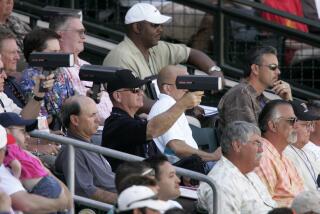Decision on gay Scout leaders settles the issue — or not
- Share via
After nine years in the Boy Scouts, Jordan Montgomery is on track to attain the group’s highest rank.
On a sweltering day last weekend, the Bakersfield teenager completed his Eagle Scout Service Project — building a storage facility for an AIDS hospice in his hometown that will hold donated wheelchairs and medical supplies.
Jordan is gay.
Because his troop is sponsored by the Mormon Church, the church in which he was raised, he could be banned from Scouting as soon as he turns 18. That’s the age at which the program ends and young men can apply for leadership positions.
Although the Boy Scouts of America announced this week that it would lift its blanket ban on openly gay adult leaders, the policy includes a religious exemption: Individual church-sponsored troops still can deny leadership positions based on sexual orientation.
The compromise, which comes two years after the Scouts lifted a ban on openly gay youth, was greeted this week with applause as well as skepticism, indicative of the divisive debate over how to balance gay rights and religious rights.
Questions remain over how the new policy will affect Boy Scout membership and funding. About 70% of troops are affiliated with religious groups.
The Mormon Church, the 105-year-old youth organization’s biggest sponsor, said in a statement that it was “deeply troubled” by the Scouts’ decision and was considering cutting ties. In 2013, according to the Boy Scouts, about 17% of youths involved nationwide belonged to troops sponsored by the church.
Allowing openly gay leaders, the church said this week, was “inconsistent with the doctrines of the church and what have traditionally been the values of the Boy Scouts of America.”
Church officials declined to issue any further public comment.
Wendy Montgomery, Jordan’s mother and an active Mormon, criticized the Mormon response.
“Apparently it’s OK for my son to be a Scout at 17 3/4 years old, and then it becomes unacceptable for him to become a leader,” Montgomery said. “He’s the same person.”
Jordan started Cub Scouts when he was 8 and came out as gay at 13.
Troop leaders began calling him “sissy” and “fruitcake,” Montgomery said. When Jordan completed the requirements for merit badges, she said, some leaders said they had lost the signed acknowledgments and made him redo the work. On camping trips, Jordan’s father would have to come along “so no one would have to sleep in the tent with the gay kid,” Mongtomery said.
Jordan decided to stay in Scouting just to finish what he had started and get his Eagle Scout rank. “He has more than earned his Scouting advance,” Montgomery said. “But I think he will be very glad when all this is done.”
Lorri L. Jean, chief executive of the Los Angeles LGBT Center, said the religious exemption of the Scouts’ new policy does little to curb discrimination.
“What it does is allow some of these troops in more progressive areas to treat everyone fairly without violating the national policy, but it doesn’t really stop anyone who wants to from discriminating,” she said. “They’re saying, ‘Well, we’re not going to make you discriminate against gay people, but if you want to, go ahead.’ ”
On Monday, leaders of the National Catholic Committee on Scouting said that while they were concerned about “practical implications” of the policy, it seemed to respect the rights of church-sponsored groups to choose leaders consistent with their religious beliefs. In a statement, national Chairman Edward P. Martin and national Chaplain Michael P. Hanifin encouraged churches to continue chartering troops.
“If you are like us, you joined Scouting to make a difference in the lives of others,” they wrote.
For leaders of Trail Life USA, a youth program that bills itself as a Christian alternative to the Boy Scouts, the new policy represents a moral decline.
Formed in 2013 after the Scouts decided to allow gay youth, Trail Life USA now has nearly 25,000 members in 49 states, said John Stemberger, the organization’s chairman. Stemberger, a former Boy Scout troop leader in Florida, called the decisions to allow gay troops and leaders “very sad” and a threat to youth safety that “will increase boy-on-boy sexual contact.”
But Chuck Keathley, chief executive of the Scouts’ Greater Los Angeles Area Council, said: “We are thrilled to have the opportunity to put this divisive societal issue behind us.
“Our board has long felt that Scouting should be inclusive and that behavior is what should determine whether you can be a member, not orientation.”
Janel Hastings’ 11-year-old son belongs to Troop 407 in Claremont, which is sponsored by the Claremont United Church of Christ. He has marched in gay pride parades with the advocacy group Scouts for Equality, of which he is a member.
When her son was 9, Hastings said, he told her that if the Scouts didn’t allow gay members, he would quit.
“My kids have come to understand that this is the civil rights issue of our time,” said Hastings, adding that she could accept the religious exemption as the right step, for now.
“I’m sending good thoughts to the churches and organizations struggling with this,” she said. “I know the struggle is genuine.”
Twitter: @haileybranson
More to Read
Sign up for Essential California
The most important California stories and recommendations in your inbox every morning.
You may occasionally receive promotional content from the Los Angeles Times.










